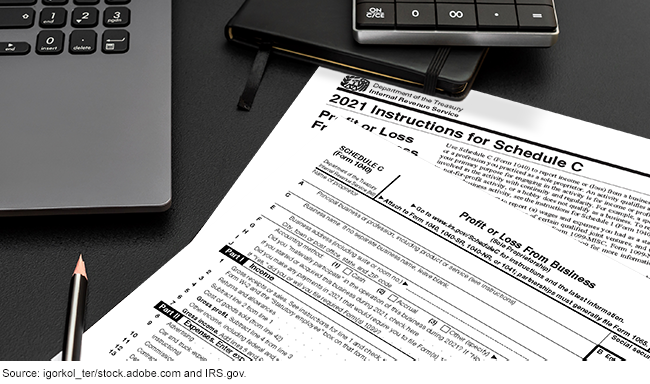Tax Equity: Enhanced Evaluation Could Improve Outreach to Small Business Owners
Fast Facts
COVID-19 tax provisions were aimed at helping employers and the self-employed maintain payroll and address health-related leave. But we found that some small business owners struggled to use these tax provisions—partly because they didn't know how.
Our review of relevant tax forms found that claiming the provisions was a complex process. Small business representatives said it was hard to get clear information from the IRS and to access professional tax help.
We recommended that IRS evaluate how it can improve outreach to small businesses, particularly when tax provisions are introduced or changed.

Highlights
What GAO Found
The Internal Revenue Service (IRS) does not collect data on taxpayers, including small business owners, regarding their race, ethnicity, or sex. This makes it difficult to determine if tax provision use varies by demographic group. In the absence of these data, GAO used data from other federal agencies, other taxpayer information, and specific analytical methods to help identify or estimate taxpayers' respective demographic characteristics.
GAO analyzed the use of COVID-19 tax provisions—specifically, paid sick and family leave credits and payroll tax deferrals for employers and the self-employed, as well as the Employee Retention Credit—among a study population of single-owner businesses in tax year 2020. GAO matched data from different agencies to identify the recorded sex of business owners and estimated race and ethnicity of selected taxpayers using an imputation method. This method calculates the probability that a person with a given surname and residential location will identify with selected racial and ethnic groups.
GAO found limited use of the tax provisions by small businesses. Less than 7 percent of eligible small businesses within the study population used the employer and self-employed leave credits or payroll tax deferrals. GAO also found some estimated differential use by demographics of business ownership within the study population. For example
- Self-employed leave credits. GAO estimated that eligible Black or African American- and Hispanic-owned businesses were more likely to use these credits compared to Asian- and White-owned businesses.
- Employee Retention Credit. GAO found that a slightly higher percentage of female-owned and Asian-owned businesses used this credit compared to other businesses filing employment tax returns.
Almost all of the small business organizations GAO interviewed identified a poor understanding of the tax provisions as a potential cause of the limited use, particularly among very small businesses. GAO's analysis also identified information and recordkeeping requirements as a potential barrier contributing to limited use. IRS provided information to small businesses on the provisions and used some measures to evaluate its outreach, such as informal feedback and compliance data. However, GAO determined that these measures did not provide relevant and complete information.
A January 2021 Executive Order on advancing racial equity directed agencies to assess their programs and policies to determine if they perpetuate systemic inequalities among groups. Further, the Department of the Treasury's strategic plan includes equity goals involving outreach and education to underserved communities. Enhanced evaluation of ongoing outreach efforts could help IRS develop information useful to groups with different needs, including very small businesses and owners from various demographic backgrounds. While the period of eligibility has passed for these COVID-19 provisions, evaluating outreach could also enhance IRS preparation for communicating tax relief information in future emergencies.
Why GAO Did This Study
The COVID-19 pandemic has resulted in significant turmoil in the U.S. economy. Congress enacted tax provisions in pandemic relief efforts to support businesses. However, little is known about the effects of these tax policies by demographic backgrounds of business owners.
The CARES Act includes a provision for GAO to report on its ongoing COVID-19 monitoring and oversight efforts. GAO was also asked to review the effects of selected tax policies on small businesses by race, ethnicity, and sex as part of this oversight.
This report, among other things, estimates use of selected COVID-19 tax provisions by race, ethnicity, and sex of small business owners. It also evaluates potential barriers in accessing COVID-19 tax provisions among small businesses.
GAO analyzed data from IRS, the U.S. Census Bureau, and the Social Security Administration; reviewed literature on analytical methods; and interviewed representatives of small business organizations and agency officials.
Recommendations
GAO is recommending that IRS evaluate its outreach efforts to very small businesses and owners with diverse backgrounds, using relevant and complete information, to inform future outreach. IRS agreed with this recommendation, noting the complexity of evaluating outreach in the absence of demographic data.
Recommendations for Executive Action
| Agency Affected | Recommendation | Status |
|---|---|---|
| Internal Revenue Service | The Commissioner of IRS should evaluate IRS's outreach efforts to very small businesses and owners with diverse backgrounds, using relevant and complete information, to inform future outreach. (Recommendation 1) |
IRS agreed in principle with this recommendation, but as of March 2025 IRS said it has planned no action to address it. In its letter responding to our draft report, IRS agreed that it should evaluate its outreach efforts and emphasized the complexities associated with reaching diverse groups of small business owners using demographic data, since such data are not tracked or collected by IRS. IRS also stated that it plans to collaborate with Treasury on demographic data collection, which it will use to refine future education and outreach materials. We acknowledge the complexities IRS faces in evaluating outreach to different groups in the absence of demographic data on tax provision use. We agree that working with Treasury to estimate use of tax provisions by demographic groups could help refine future outreach efforts. While demographic data is one information source, IRS could also consider using other information to enhance outreach evaluation, such as equity measures built into the partner feedback process. Such efforts could help IRS refine its outreach during future emergencies and alleviate barriers for small business owners, including those with varying racial and ethnic backgrounds.
|
